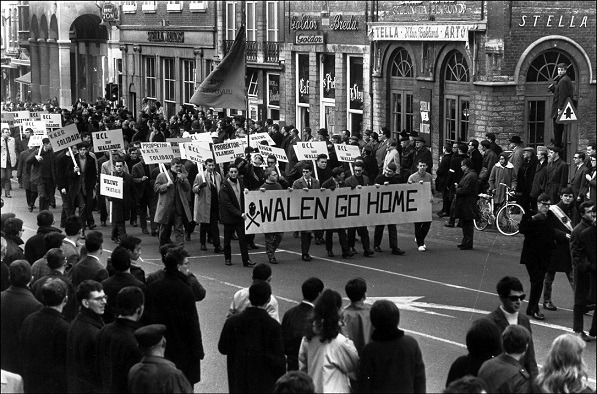We are about to celebrate the 50th anniversary of the May 1968 event in Paris. What was the mood in Brussels at the time? In May 68, I was still at secondary school. But my classmates and myself were following the events closely. What we saw on television was mind-boggling. We were talking of the “May revolution”. We thought it might be the outbreak of a completely new era — perhaps as the young Karl Marx did when he was following from Brussels the Paris insurrection of 1848.
Along with some of my classmates, I could not resist the pull. We spent a couple of days in Paris some weeks after the start of the trouble. There were still crowds of young people striking, demonstrating, chanting, distributing leaflets in the streets.
I remember in particular a huge gathering at the Palais de Chaillot. A young woman and a young man arrived carrying a large American flag. They took their clothes off and made love under the flag — or at least did everything to suggest that they did. When they emerged and ran off wrapped in the flag everyone cheered. My God, I thought, this is really different from life in my catholic boys school in Ganshoren.
Meanwhile, was everything quiet in Brussels?
All Belgian campuses were receptive to what was happening in Paris at the time and indeed in many other cities in Europe and beyond. The Free University of Brussels, in particular, was the site of a powerful contestation movement, with students occupying part of the campus from May to July 1968 and a flourishing of left-wing activity with Maoists and Trotskyites at the forefront.
The student climate remained very agitated for quite a while afterwards. Most memorable for me is something that happened in September 1972. I was then a second-year student at what is now called Université Saint Louis, a small institution located in the centre of Brussels. Because of a decision by the national government to raise the fees of foreign students, some students went on hunger strike in Leuven, where the Francophone university was still located at the time.
As president of the Saint Louis student union, I thought we had to show our solidarity — which we did by marching towards the Justice Ministry with a few hundred students, while chanting “Solidarité étudiants étrangers”. The Brussels police did not appreciate this unauthorized demonstration and I ended up in a cell.
Did the 1968 agitation have any long-term effect in Belgium?
It had the same sort of slow cultural liberation effect as it had elsewhere and some immediate effect on the structures of academic institutions, with students entering decisions-making bodies from which they were entirely excluded until then.
However, something else coincided in Belgium with the general contestation phenomenon, something that had a far deeper impact on the fate of the country. In 1968, Belgium’s most massive and most violent demonstrations happened in Leuven. The main slogan was not “L’imagination au pouvoir” or “Sous les pavés la plage”, but “Leuven Vlaams” and “Walen buiten”. What the students of the Dutch-language section of the University were demanding, with the backing of their professors and of a broader movement spanning the whole of Flanders, was that the French section of the University should move out of Leuven.
Founded in 1425, the University functioned in Latin until the 18th century, later exclusively in French until the 1920s, when some courses started being offered in Dutch. In the1960s, with the arrival of the baby-boomers, both sections of the University had to expand. What the Flemish movement was afraid of was that the further growth of Belgium’s oldest and biggest Francophone university in and around the Flemish town of Leuven would further spread the “oil stain” of dominance of the French language far beyond Brussels.
“Walloons Go Home” was their conclusion and their slogan. My predecessors in the Francophone University were outraged. Given that French had been the University’s medium of instruction for much longer than Dutch, they felt they had every right to stay in the beautiful old town.
The conflict could not be settled internally and spread to the national government, which itself could not get its French-speaking and Dutch-speaking components to agree and had to resign. The governmental crisis lasted for 132 days — a record at that time — and could only be solved when the Francophone parties agreed to the transfer of the French section of the University to Wallonia, with the funding for the new campus in Louvain-la-Neuve provided by the national government.
The intensity of the conflict left deep and lasting marks in Belgian political life. One after the other, all three national parties — Christian-democrat, liberal and socialist — split up along linguistic lines. This made Belgian politics ever since even more laborious than it could otherwise have been.
Nonetheless, even though I have been a student and then a professor at the Francophone University ever since 1971, I must say that the decision to expel us from Leuven was one of the wisest in the history of the country. Had this difficult decision not been made, the province of Brabant wallon (where Louvain-la-Neuve is located) would not have joined Vlaams Brabant (where Leuven is located) as one of Belgium’s two most prosperous provinces and the only thriving one in Wallonia.
Moreover, after a difficult, tense period, the Universities of Leuven and Louvain survived their split quite happily. They are today the largest universities on their respective sides of the linguistic border. Thanks to what happened in 1968, they also collaborate far more smoothly than they ever did before and — certainly — than they would have done had Louvain managed to keep imposing its presence in Leuven.
The Brussels Times

